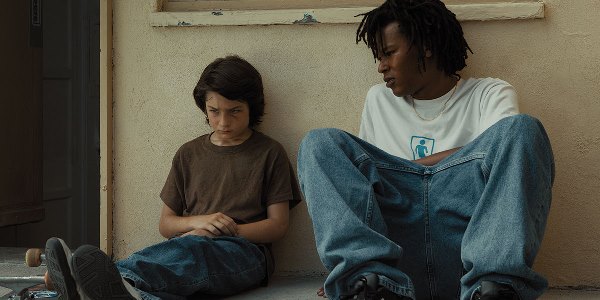Actor Bradley Cooper may be winning all the attention with A Star Is Born, but actor Jonah Hill, also debuting as a feature film director, has made one of the most exuberant and observational films of the year. It’s engaging, whether or not you grew up in Southern California in the 1990s as a skateboarder who coveted to be one of the bros. Though it was arguably made for adults, this is the type of coming-of-age movie that would appeal to teens, but because of its R rating—and the characters do drop F-bombs whenever they can—the film faces the challenge of reaching a core audience.
The film works largely because of the cast, most of whom are non-professional skateboarders. So it is never in doubt why the reserved Stevie (Sunny Suljic, 11 at the time of filming and a professional actor and skater), would look up to older, cocky skateboarders, especially the leader of the pack, Ray (Na-Kel Smith), who has an easygoing and forthright manner.
The gang includes Fuckshit (Olan Prenatt), so nicknamed because that’s his go-to response for anything. He’s the rebel rouser and attention getter, with long, flowing blonde ringlets out of a Raphael painting. Fourth Grade (Ryder McLaughlin) is so labeled for allegedly not being so bright, but it may be because he’s not the most verbose. He’s actually more visually oriented and always totes a portable video camera.
Ruben (Gio Galicia) is closer to Stevie’s age and the most conflicted of the bunch. He loves lording over the younger Stevie and teaching him the ropes of the group’s etiquette: never say thank you, otherwise everyone will think you’re gay. He acts tough but he’s not good at hiding his resentment for feeling displaced as the newest new kid on the block transforms from quiet observer to an up-for-anything follower. Stevie will face any challenge to win the approval of the big boys, whether that means performing skating stunts that could break his neck, drinking too much beer, or smoking so much weed he can barely walk. It’s worth noting that Ruben has no nickname.
Despite the kids’ misogynistic and homophobic sense of humor, the film is actually very sweet underneath the loud, flippant exterior. The movie bears an uncanny resemblance to Bing Lui’s recent documentary Minding the Gap, which covered the filmmaker and other skateboarders in the Midwest Rust Belt in the 2000s. Many of the same issues pop up in Hill’s movie: the prevalence of single-parent households; the search for some sort of leadership, aka a father figure; and basically the figuring out of what it means to be a man. Who knew that skateboarding was having its moment in film? Not to be overlooked is another feature film about skateboarders, the female-lead Skate Kitchen.
However, the film is much darker than the skateboarders’ laid-back attitude may imply. The script adds an undercurrent, namely Stevie’s abuse by his older brother, Ian, played by Lucas Hedges—this may also be the year of Hedges. His layered and utterly convincing performance joins his star turn in the upcoming Boy Erased and Ben Is Back. However, some of the physical violence inflicted upon Steve comes from within. Usually when a film depicts individuals self-harming themselves, it centers on a female character—I can’t help but think of Isabelle Huppert in The Piano Teacher. Now she has competition in Stevie, who directs his anger towards himself in alarming ways.
The film boasts stellar 16mm cinematography by Christopher Blauvelt (Don’t Worry, He Won’t Get Far on Foot), shooting from all conceivable angles. Expertly framed, it was filmed in the square-shaped Academy aspect ratio, giving it an appropriate home video feel. Though made on a low budget with an unknown cast, this film has major talent behind it, including Trent Reznor and Atticus Ross providing the undulating score accompanying the strong soundtrack of the titular decade: Morrissey, the Pixies, and A Tribe Called Quest. Even with the Teenage Ninja Turtles posters and merchandise, the touchstones of the time don’t clutter the production design, except for certain wardrobe choices and hairstyles. The movie’s relatively low on Clinton-era kitsch.
It’s not every filmmaker who can pull off shocking moments without telegraphing exactly what’s about to happen, and how Hill has directed his cast is also refreshing. He has eschewed the standard direction for young actors: to underplay to the point of becoming inscrutable. Viewers have a sense of how the characters feel or what they are thinking without the acting becoming overstated. The main cast is effortlessly expressive, while also trying to be cool.
This rowdy and sometimes disturbing film is as perceptive as last year’s acclaimed, dialogue-driven coming-of-ager Ladybird, and just as savvy.







Leave A Comment